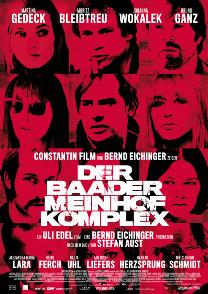Released in 2008, Germany’s The Baader Meinhof Complex begins in 1967. The entire world appears to be in the grip of protest and revolution. The Viet Nam War is raging. Economic inequality is increasing. For neither the first nor the last time, the Middle East is consumed with conflict. All across Europe, young Leftist activists protest against what they consider to be American imperialism.
At a protest in Berlin, the police shoot and kill an unarmed student. Outraged by not only the shooting but also the lack of accountability on the part of the police, journalist Ulrike Meinhof (Martina Gedeck) announces on television that, even though the Nazis may no longer be in power, Germany is still a fascist state. Her words scandalize many viewers but they inspire two young activists named Andreas Baader (Moritz Bliebtreu) and Gudrun Ensslin (Johanna Wokalek). Baader and Ensslin protest by blowing up a department store. Their subsequent arrest and trial makes them celebrities. It also leads to them meeting with Meinhof, who finds herself drawn to the two charismatic radicals. Though convicted, both Baader and Ensslin are released pending an appeal and they soon become the leaders of the Red Army Faction. They amass a following of other young radicals, many of whom are searching for some sort of purpose for their lives. Among those who join them is Meinhof herself, who abandons her safe, middle-class liberalism and instead commits to Baader and Ensslin’s revolution. For every violent act that Baader and Ensslin mastermind, Meinhof writes the press release that justifies it by pointing out the violent acts being carried out by governments acoss the world.
At first, the revolution itself is almost fun. Baader and Ensslin both obviously enjoy their celebrity. When the RAF goes to Jordan to attend a sort of terrorist training camp, they promptly get on their host’s nerves by appearing not to take their training particularly seriously. The heads of the camp want to teach combat skills. Baader just wants to learn how to rob a bank and he and Ensslin take such delight in upsetting the stuffy heads of the camp that it’s hard not to like them. From the start, though, there are hints that the fun isn’t going to last. Baader may be charismatic but he’s also arrogant, temperamental, and lacking in self-awareness. He’s the type of revolutionary who will goad his lawyer into stealing a woman’s bag but who throws a fit when, moments later, someone else steals his car. For all their talk of how they’re willing to do whatever it takes to bring about a revolution, neither Baader nor Ensslin seem to initially understand the true risks of their activities. When a member of their group is killed in a shoot-out with the police, they are stunned and angered, as if it never occurred to them that the police would kill someone who opened fire on them. As the RAF’s action grow more violent and more people are killed as a result, Meinhof struggles to justify the violence. Eventually, not even Baader and Ensslin can control the organization that they’ve created.
It’s a familiar story. What starts off as idealism is eventually consumed by fanaticism and cynicism. The belief that’s one cause is right leaves people on both sides convinced that anything they do to promote that cause is correct. The film presents the violence of the 60s and 70s as being a never-ending cycle, with the violent response of each side merely fueling the anger on the other. At one point, a government official wonders why Baader has such a hold on his followers and the reply is that Baader has become a living myth, an activist celebrity who is idealized by his followers but who, in reality, can be just as arrogant, petty, and egotistical as those that he’s fighting. For many, he and his organization offer an escape from a pointless bourgeois existence but, in the end, he and Ensslin and Meinhof are perhaps the most bourgeois of all.
Aided by a strong cast, director Uli Edel captures the feel of a world that seems like it’s perpetually on the verge of revolution. Though the film is full of scenes of car chases, bombs exploding, and bullets being fired, Edel never allows us to forget the real costs of such actions. The film ends with the suggestion that the cycle of violence and revolution is destined never to end as one act leads to another. As the film reminds us, it’s a story that has played out many times in the past and will continue to play out in the future.

Pingback: Lisa Marie’s Week In Review: 4/24/23 — 4/30/23 | Through the Shattered Lens
Pingback: Lisa Marie’s Week In Review: 5/1/23 — 5/7/23 | Through the Shattered Lens